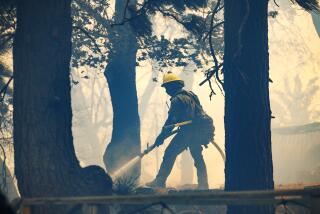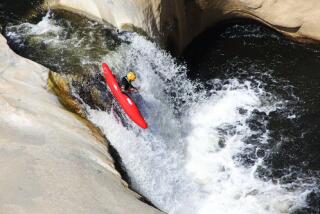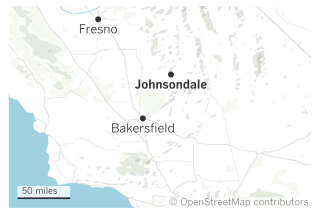A High Sierra state of mind
MONO PASS TRAIL — Mary Breckenridge crosses the High Sierra every year, with only her horse and two mules for company.
She always leaves in September, when heat still tents the Central Valley but cool mountain breezes stir silvery-green aspen leaves.
Higher up, the nights could be so cold that the water in her coffee pot turned rock-hard. It’s happened. She kept going. Packing and unpacking 300 pounds of gear daily, making and breaking camp, starting her fire from twigs.
Reporter’s notebook: Follow the journey
It made her feel thrillingly self-reliant. A true Western woman.
Except, now she’s 64, and she’s not sure she can do it anymore. Not alone.
Bucko Davis had sworn he was done with packing. He’d had enough of being so tired that he would unload a pile of gear from a mule, plop down on top of it and have people walk by without realizing there was a limp body beneath the cowboy hat pulled over his face.
Then Mary tracked him down. They’ve been friends for 30 years, since he was a packer and she was a cook on commercial High Sierra trips. She needs him as backup.
Once long ago, Bucko said he would never tell her “no.” He agrees to the trip.
He’s spent his whole life in these mountains. He loves how the junipers line up for sentry duty along the ridges, the way edible mushrooms pop out amid the damp undergrowth.
Maybe now he can know if they will ever let him leave in peace.
::
Climbing the ridge out of Lake Edison on the first morning of their trip, Bucko, a Mono Indian, points to a distant peak.
“My brother Henry’s up there now,” he says.
Mary was at Henry’s all-night funeral powwow — the only non-Indian woman dancing and chanting beneath the stars and oaks. Henry had given her the eagle feather she wears on her black cowboy hat.
Bucko scattered his older brother’s ashes on Volcanic Knob. The ashes of Henry’s best friend were spread on the mountain across from his. “They were both ornery. You can still hear them hollering across at each other,” Bucko says, referring to thunder.
The horses are as fidgety as children on the first day of school. Mary’s favorite mule, Dixie, keeps trying to kick her pack-mate, Woody.
“Dixie, huh-nee, don’t “ Mary chides in her Bakersfield twang.
She’s blond with broad shoulders and a broad smile. Bucko, gray showing in his dark ponytail, is small, lithe and tends to limit his expressions to his gray-blue eyes. Both have the rolling gait of people who’ve spent a lot of time on horseback.
The three-day ride will carry them over the 12,000-foot Mono Pass, one of the shorter routes Mary has traveled in the past. Bucko has ridden almost every Sierra trail but somehow never crossed over on this old Indian trading path. It runs through a vast wilderness area where, for hundreds of square miles, there are no paved roads.
By late afternoon, the clink of horseshoes climbing granite has settled to a steady beat. Volcanic Knob is far behind by the time they make camp.
Mary unpacks her mules, shaking from exhaustion as she lifts the heavy metal food containers. She doesn’t call Bucko over, but says she’s glad he’s around.
“It would be a hell of a thing if I got out here alone and then found out I couldn’t do it.”
She ties her three animals to a line she rigs high between two trees, in a way that allows them to move without getting tangled up. She curries them, serves them dinner in nosebags and gives her horse, Surprise, a long hug, resting her face against his neck.
Mary rolls out her sleeping bag right next to them. She doesn’t wear her hearing aid at night, depending on Surprise, Dixie and Woody to alert her to danger. She only uses a tent if it’s freezing or raining hard.
The tremor she takes medication for has set in. Doctors have told her it’s not the onset of Parkinson’s or some other neurological disease, but it makes her arm and hand shake, like now. Her arthritic shoulder aches. Her face is flushed and damp.
She looks up at the mountains — fired with the pink and tangerine of alpenglow — and smiles.
“I just love this,” she whispers.
::
Mary sleeps between a bag of Purina horse chow and a sizable alarm clock. She snores until it goes off at 8 a.m. It’s a treat to sleep in.
Bucko leaves camp early and walks along a shimmering river. It’s his chance to give thanks to Grandfather Mystery, who created Mother Earth. Bucko was raised by his grandmother, who picked berries, wove baskets and taught him the traditions he follows.
“Every day, I thank the Grandfather for another day of life and for my eyes to see it,” he says with an intensity that belies his mosey-along demeanor.
He’s 52. “But I’m old before my time,” he says.
His liver is damaged. He drank hard for many years — even though he knew that Native Americans often lack an enzyme to process alcohol. Even though he’d seen what it had done to Henry.
Twelve years ago, a doctor told Bucko he was killing himself. He thought of his daughter, Autumn, and quit drinking for good, he says.
Now 16, Autumn can sit any horse. He says she’s beautiful, fearless and girlie, even though he raised her and “just didn’t know nothing about all that girl stuff.” She recently made him take her to a dress-up tea party, but she also has turquoise cowboy boots, just like his, that she wears to a high school where none of the other kids dress “cowboy-like.” He respects that.
Every night when he unloads the gear, Bucko’s turquoise boots are on top of the pile. But he rides in thick, lace-up camp shoes. Bucko seems to have hung up his boots — while still carrying them on the horse.
Mary has coffee brewing in a tin pot over a campfire.
She and Bucko sit chummily on a log with their mugs, laughing over previous trips. The time she was sleeping near the food and a bear walked right up and sniffed her face. The time they sat on their dusters and slid down an icy trail.
“Oh, Bucko, “ Mary says. “If I die before you, will you scatter my ashes?”
“Sure, just tell me where you want to be put,” he says, with no more inflection then if she’d asked him to move the coffee pot.
She walks away to fill her cup, and he wipes his face with his hand.
“That brought a tear to my eye,” he says.
::
Someone once told Mary that the way to hold a moment in your mind forever is to list at least three things you can see, three you can hear, smell, feel.
She rides Surprise beneath cliffs scuff-marked by ancient glaciers, adding to her lists: Her favorite flower — shooting stars — just past bloom. A jagged ridgeline, the smell of dust and horse sweat and butterscotch pines. Her skin prickled by sun, the shade of her hat on her face. Surprise’s breathing. Silence.
She hangs back.
“Being alone in the scenery, you get a sense of being a very small but very important part of everything around you,” she says.
A dozen years ago when Mary first crossed the Sierra alone, it was by accident.
She had enlisted a girlfriend to go along. But the drive up a steep, winding road unnerved her companion. On the trail, the friend chain-smoked and complained that Mary didn’t seem to know the way.
“I was getting madder and madder,” Mary recalls. “I was saying things to her I didn’t even say to my mother — and me and my mother had some knock-down, drag-out fights.”
The next morning, she left her friend near Lake Edison at an outpost with one of the only phones in the backcountry. Then Mary rode off in a huff.
What she discovered on that trip — and all those that followed — was focus. “Do you ever get where you just feel good and scrambled in the brain?” she asks.
Her day-to-day life can be harried. She inherited her father’s agricultural lands, bought more and now runs a 600-acre farm. She is in the middle of what she says will be her biggest and last business deal. She recently called upon her Berkeley-based life coach to help her take a deep breath.
But out here, the priorities of what she needs to do are simple and clear.
“To sleep on the ground — well, talk about being grounded!” she says.
On the final morning of the trip, Mary’s alarm clock rings and she stretches her arms overhead, taking a long look at the golden light on the mountains.
Bucko, whose animals wander at night to graze, is off rounding them up.
(One of the snapshots Mary holds most clearly in her mind is of Bucko on one knee in a Sierra meadow, calling his horses to him by nibbling a little grain himself and then holding out some to them. The grass sparkled with dew.)
Hours pass, but Bucko doesn’t return. Mary prepares to ride on.
It’s the Western way, she says. When things happen, you keep going. Bucko’s stock probably headed home. He might have to walk 20 miles to find them.
“Bucko is very tough,” she says. “He’s walked a lot farther.”
She scoffs at the idea that something may have happened. A purse sits open on a log, holding the prescription medicine Autumn had packed for him. He has his Indian medicine bag, the one with the beading and small totems he has picked up through his life, with him.
A cowboy wearing yellow leather chaps rides into camp, and he’s leading Luke, Bucko’s pack horse. Terry Elliott said he’d found Luke grazing in a canyon.
When Elliott hears that Bucko is missing, he offers to ride down the trail to look for him. Two weeks earlier, Elliott had lost his horses in Sandy Meadow to the south.
“That’s big country. I was all alone,” he says. “I was scared. I like to think someone would have helped me if they were around.”
Within an hour, thundering hoofbeats announce his return — with Bucko and the animals.
“I was surely glad to see Terry,” says Bucko.
::
They are off to a very late start. The skies are gray, and a breeze carries a hint of salt.
“Well, Buck. Do you think it’s going to rain?” Mary asks.
“Not much to do about it either way,” he replies.
It is near dusk when they go through Mono Pass, with its moonscape of bone-colored sand dunes and lifeless lake. Coming down the steep trail on the eastern side, the horses stumble. It rains.
Bucko abandons decades of following a “no-whining” packer’s creed.
“I don’t like being cold! I don’t like being hungry! I’m too old for this! I don’t like this! No packer would! Except for Mary!”
Mary merely chuckles: “Look at you, Bucko! You’re all fired up!”
They reach the pack station on the eastern side as darkness sets in. Bucko’s blood pressure drops dangerously low — the stress of being at high altitude. He and Mary must stay two days before he’s well enough to withstand the drive over Tioga Pass.
Bucko started packing when he was 8, but this will be his final High Sierra pack trip. Mary vows to be back next summer. She’s learned she still can do this alone.
But before any of that happens, there is a final climb on the green western side of the Sierra. Steep switchbacks reveal new vistas with every twist.
“Isn’t it beautiful?” Mary shouts repeatedly.
Bucko is the first to reach the highest peak.
Below are mountains in accordion pleats of blues and lavenders. Near him, the sparse vegetation is brittle, and a cold wind pushes his hat. He looks out, considering why humans usually place their gods and mystics on the highest mountain.
Even he — who believes God is everywhere, his spirit in every rock and tree — climbed and climbed to scatter Henry’s ashes.
Bucko gazes at the blue lakes, the green glens, the sweeping white stripes on granite rock, the endless sky.
“You know,” he says. “I think it’s the view.”
Reporter’s notebook: Follow the journey
More to Read
Sign up for Essential California
The most important California stories and recommendations in your inbox every morning.
You may occasionally receive promotional content from the Los Angeles Times.











